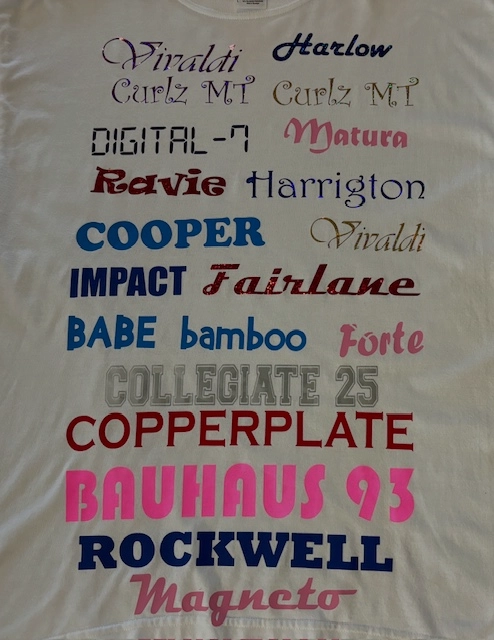The Art of Customized Needlework: Opening the Secrets to Creating Unique and Unforgettable Styles
Embroidery, a craft steeped in tradition and virtuosity, holds within its intricate stitches the power to change material right into a canvas of unique expression. The tricks to producing personalized embroidery designs that astound the eye and leave a long-term impression depend on a delicate equilibrium of strategy, imagination, and attention to information. As we dig into the globe of customized embroidery, we reveal the nuanced interaction between thread option, stitch intricacy, and layout customization that raises a mere garment to an artwork. Join us on a trip via the art of custom embroidery as we untangle the enigmas behind crafting genuinely memorable and distinctive developments.
Picking the Right Embroidery Threads
When selecting needlework threads, what essential factors should you think about to make certain the most effective outcomes for your custom-made layouts? The choice of needlework thread is critical in identifying the last outcome of your embroidered design. One of the key factors to consider is the product of the thread. Various products such as cotton, polyester, rayon, and silk supply differing levels of shine, durability, and texture. It is vital to select a thread product that complements the material you are stitching on and lines up with the desired look of the style.
Thicker threads can add dimension and appearance to your design, while finer strings are excellent for intricate details and tiny message. In addition, considering the shade fastness and washability of the string is essential to guarantee that your custom styles maintain their top quality and vibrancy over time.
Checking Out Various Stitch Strategies
To explore the world of 'Checking out Various Stitch Techniques', one must understand the intricacies and nuances that each stitching method gives the art of embroidery. Various stitch techniques not just add aesthetic passion however also add to the general texture and dimension of the design. One preferred stitch technique is the satin stitch, which entails closely jam-packed parallel stitches to produce a smooth and glossy surface, suitable for completing shapes and creating bold lays out.
On the various other hand, the backstitch is a functional strategy typically made use of for outlining and adding fine information. It entails sewing backwards to create a strong line of needlework. In addition, the French knot stitch includes a tactile element to styles, ideal for producing textured accents like flower centers or attractive touches.
Discovering different stitch strategies permits embroiderers to have fun with light, shadow, and depth within their styles, elevating the visual charm and creative top quality of their needlework projects. By grasping numerous sewing methods, one can open countless possibilities for producing special and unforgettable custom needlework items.
Incorporating Personalized Layout Aspects
Having actually checked out the details of different stitch strategies such as the satin stitch, backstitch, and French knot, the focus currently shifts towards incorporating personalized layout components in custom embroidery projects. Customized design aspects play an important function in making embroidery jobs really one-of-a-kind and remarkable. One way to incorporate personalization is by including initials, names, or considerable dates to the design. This not just includes a tailored touch yet likewise boosts the emotional worth of the embroidery piece.
Another method to include customized layout aspects is by consisting of symbols or themes that hold unique meaning to the recipient or show their passions and character. As an example, including a preferred blossom, animal, or pop over to this site hobby-related icon next can make the embroidery layout more meaningful and individualized. Furthermore, selecting colors that resonate with the recipient or line up with the designated motif can further enhance the customization of the embroidery project.
Grasping the Art of Color Control
One trick aspect of shade coordination is recognizing color theory. This consists of knowing exactly how various colors engage with each other, the feelings they convey, and exactly how they can be integrated to create aesthetically attractive layouts. By using shade concept concepts, embroiderers can develop harmonious shade palettes that enhance the general appearance of the layout.
Furthermore, paying focus to comparison is crucial in shade control. Utilizing contrasting colors can help specific components of the layout pop, improve clarity, and develop a visually vibrant needlework item. By grasping the art of shade sychronisation, embroiderers can boost their layouts and produce memorable pieces that resonate with customers and viewers alike.
Enhancing Structure With Advanced Needlework Stitches

Bullion knots, on the other hand, can be used to create twisted, ropelike elements that add an elegant feeling to the embroidery. Experimenting with these innovative needlework stitches allows you to push the limits of standard needlework and create absolutely unique and aesthetically enticing textures in your layouts.
Conclusion
In verdict, the art of custom-made embroidery entails a combination of picking the right threads, discovering numerous stitch strategies, integrating customized layout elements, grasping shade control, and boosting texture with advanced stitches. By comprehending and carrying out these vital elements, embroiderers can produce unique and memorable designs that display their imagination and ability. Needlework lovers can open the keys to creating attractive and custom pieces that stand apart and leave a long-term impression.